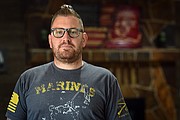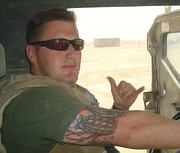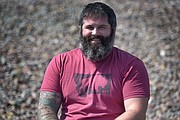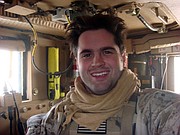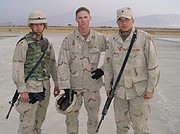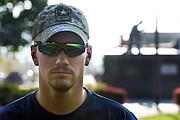Flathead veterans reflect on their service after 9/11
The events of Sept. 11, 2001, were ones that changed the world.
For four Flathead Valley veterans, and countless others, that one day would change their lives forever, setting into motion events that continue to have repercussions for them 20 years later.
Wanting to get out and see the world, Whitefish’s Eric Hill was 17 when he joined the United States Marine Corps’ delayed-entry program in 2000. It was the events of 9/11 that would determine the next 10 years of his life.
“In 2000, there wasn’t much here except construction and railroad work and I wanted to get out of here to see something else and do something else,” Hill recalled. “It was an interesting time for me. I joined what we considered to be a peacetime Marine Corps, only to spend 10 years in combat areas thanks to what happened on Sept. 11.”
Hill remembers the events of that September morning well.
“My alarm in the morning was the radio and I heard what was going on as soon as I woke up that morning,” he said. “I went downstairs and turned on the television as the call came in that the mall was going to be closed that day and I didn’t have to go to work. I spent a lot of that day trying to get in touch with my recruiter to see what it all meant for me.”
Two months after the attacks of 9/11, Hill spent his 18th birthday learning the ins and outs of Marine life during his first day at boot camp.
A few months later, Hill arrived at Al Asad Air Base for the first of three deployments to Iraq working as an aviation ordnance technician.
Hill also spent time at Iraq’s Al-Taqaddum Air Base as well as Camp Dywer in the Gamir district of the Helmand River Valley in Afghanistan before making the tough transition back into civilian life back in the Flathead Valley in 2012.
“Nothing here is stressful. Stealing water from civilian contractors because your men have none, that’s stressful. It’s 105 degrees and your men have no water, that’s stressful,” Hill explained. “Having to wear a hot MOP suit because of the constant threat of a chemical weapons attack, that’s stressful. Not knowing who is a friend and who wants to kill you, that’s stressful. After all of that, nothing here is stressful.”
While his experience with the Marines was stressful, Hill said it eventually led him to live a much calmer life.
“People get road rage or get mad at the long line at the Starbucks, but the level of adversity that it would take to make me upset in a daily atmosphere is just never going to happen here. There are a million things in this world that are more important than your latte,” he said. “I went from managing billions of dollars of explosives and munitions and sometimes hundreds of Marines to sitting at a desk. It was boring and easy and not outside my comfort zone, which is how you learn to live in Iraq or Afghanistan. Adjusting is hard. It’s hard to go from being important and valued in the Marine Corps to trying to find an employer that will value and appreciate you.”
Hill now lives in Kalispell and works as a dental hygienist, but is always ready to lend a hand to a fellow veteran, often finding himself giving advice to those getting ready to leave the military.
He may not be in Afghanistan anymore, but Hill has kept an eye on America’s involvement in the country, including the recent withdrawal of U.S. troops from the country. While he agrees the U.S. could not maintain a military presence in Afghanistan forever, he is less than pleased with recent events.
“We left people over there that saved lives for us. These people put in work for us for 10 or 20 years and we just left them there. That is a betrayal at a leadership level that I don’t think can ever be forgiven,” Hill said. “The price of doing business over there is having to leave things behind, but leaving these people that worked and fought alongside us, leaving them and their families behind is unconscionable.”
AUSTIN REESE joined the United States Navy’s delayed-entry program during peacetime in 2000, only to later spend three deployments in Iraq working in explosives ordnance disposal.
Growing up in the Washington, D.C., area, Reese wanted to get away from his hometown and make something of his life when he joined the Navy. He was 19 years old and at boot camp in Great Lakes, Illinois, the morning of Sept. 11, 2001.
“I had gone to the dentist that morning, but when I returned to where we were supposed to be training, it was deserted,” he said. “I went back to our barracks and found everyone huddled together around a television. It didn’t take long to grasp the gravity of what was going on. We had all joined up during peacetime, but we quickly realized that we were all about to go to war, we just didn’t know in what capacity.”
Reese was deployed to Iraq three times during his time with the Navy, first supporting the Marines in Ramadi and Fallujah in 2005 and again in the Al Anbar Province in 2008, both times working to disarm IEDs and unexploded ordnance.
Reese spent the end of 2008 and beginning of 2009 near Mosul in northern Iraq, helping support the operations of a SEAL team there.
“It was a fulfilling job, but it was weird to have to deal with something that others before me had only trained for,” he said. “IEDs were something that many people had trained for, but that few people had really had to truly deal with before Iraq.”
After losing the use of his legs in an accident during parachute training in 2013, Reese retired from the Navy in 2015, but still has strong feelings about American involvement in Iraq and Afghanistan.
“There has been infighting with the groups in the Middle East for thousands of years. I don’t know what the right answer would have been as to how to handle that situation. You look at the long history of outsiders trying to intervene over there, and it never turns out well,” he said.
“We couldn’t stay in Afghanistan indefinitely and it was going to be a mess; however, the recent withdrawal could have been handled better. We will probably never know all of the information and intelligence that was presented that led to the decisions that were made, but from the outside looking in, it’s pretty disgusting. We went in to remove the Taliban, only to replace them with the Taliban. It doesn’t make a lot of sense and it's pretty frustrating.”
JESSE NELSON was 10 days shy of his 19th birthday and a member of the Louisiana Army National Guard when he watched the towers fall alongside his college classmates in 2001.
“I slept in that morning because I didn’t have an early class on Tuesdays. I was getting ready for my job at the bookstore when I saw that the first tower had just been hit,” he recalled.
“As I watched that second tower come down, I knew that we were at war and my time in the military had just been changed forever,” he said. “I had this strange feeling come over me. I don’t think I would call it excitement, but when you see something crazy like that, then you just want to jump in right then and there. It was upsetting that I couldn’t do anything to help at that moment. We weren’t sure yet who had done that to us, but I was ready to go to war with whoever it was.”
Having joined the National Guard at age 17, Nelson had turned 18 during boot camp with promises from his recruiter that his unit would never be deployed anywhere, Nelson nonetheless found himself being sent to Afghanistan in 2003 and 2004.
It was during his time in Afghanistan that Nelson says he gained a new perspective on life, seeing how the locals struggled to survive from day to day.
“I remember walking into this school in a mud hut in one of the villages,” he said. “There was a dirt floor with dirt walls. There were no desks and no chalkboard. The only thing even remotely educational was a poster hanging on the wall identifying different types of landmines.”
While Nelson left the military in 2013, he was thinking back to his days in Afghanistan during the American withdrawal last month.
“I think it is one of the biggest military blunders this country has ever seen. I think it was treasonous. If you or I had turned over billions of dollars worth of weapons to an enemy, we would be hanged for treason, and rightfully so. When the President or Congress do it, then it is no big deal,” he said. “A tactful, well-thought-out withdrawal was what we needed. What we got was us tucking our tails and running — to hell with everyone else. It’s inexcusable.
“My time in Afghanistan is an open wound and it will continue to be an open wound for the rest of my life because of the way it ended over there,” Nelson added.
THE EVENTS of Sept. 11, 2001 also left their mark on a younger generation of service men. Kevin Bryant was only a child when the twin towers of the World Trade Center fell, but he felt the effects of that day during his time in Afghanistan in 2018 and 2019. While there, he served with the Honor Guard, carrying the caskets of fallen soldiers to the planes that would carry their remains home for burial.
“Carrying those caskets was one of the most humbling experiences of my life — feeling those caskets and seeing those flags draped over them. It put a lot of things into perspective for me,” Bryant said. “These are people who no longer get to go home. These are fathers who will never see their children grow up. These were people who truly sacrificed. Many people have no idea what that word even means, but we understand it a lot more these days.”
Reporter Jeremy Weber may be reached at 406-758-4446 or jweber@dailyinterlake.com.









